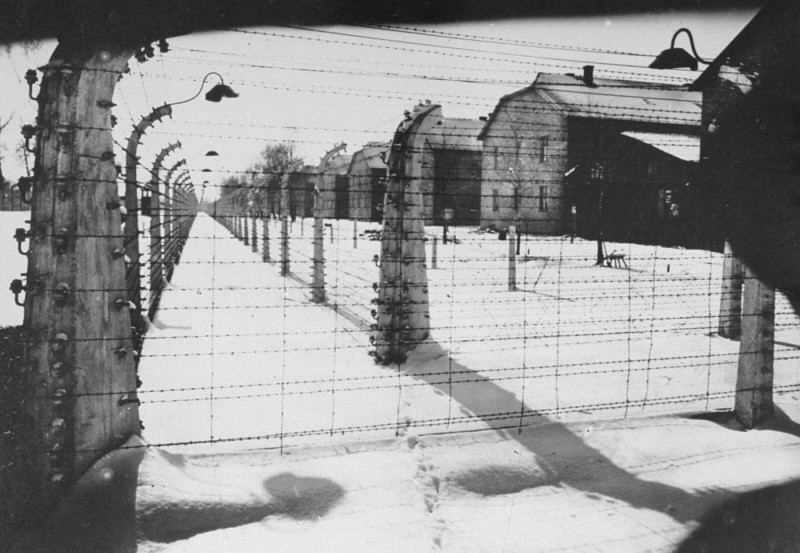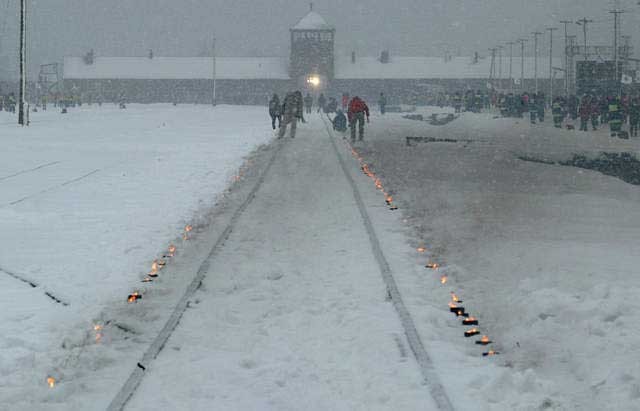
International Holocaust Remembrance Day
January 27 is designated by the United Nations General Assembly as International Holocaust Remembrance Day (IHRD). Since 2005, the UN and its member states have held commemoration ceremonies to mark the anniversary of the liberation of Auschwitz-Birkenau and to honor the six million Jewish victims of the Holocaust and millions of other victims of Nazism.
Key Facts
-
1
The purpose of International Holocaust Remembrance Day is two-fold: to serve as a date for official commemoration of the victims of the Nazi regime and to promote Holocaust education throughout the world.
-
2
Since 2010, the UN has designated specific themes for the annual commemorations that focus on topics such as collective experiences and universal human rights.
-
3
In addition to International Holocaust Remembrance Day, many countries hold national commemoration ceremonies on other dates connected to the Holocaust.
Background

On November 1, 2005, the UN General Assembly adopted resolution 60/7 to designate January 27 as International Holocaust Remembrance Day (IHRD). The date marks the liberation of Auschwitz-Birkenau and is meant to honor the victims of Nazism. The same resolution supports the development of educational programs to remember the Holocaust and to prevent further genocide.
Resolution 60/7 not only establishes January 27 as “International Day of Commemoration in memory of the victims of the Holocaust,” it also rejects any form of Holocaust denial. The resolution encourages member states of the UN to actively preserve sites that the Nazis used during the "Final Solution" (for example, killing centers, concentration camps, and prisons.) Drawing from the Universal Declaration of Human Rights, the resolution condemns all forms of “religious intolerance, incitement, harassment or violence against persons or communities based on ethnic origin or religious belief” throughout the world.
Commemoration Activities
The first commemoration ceremony was held on January 27, 2006, at the UN Headquarters in New York City. Nearly 2,200 people attended in person. Since the ceremony was broadcast live on television, many more people were able to view it throughout the world. The UN Headquarters holds official commemorations each year. UN offices across the world and other state offices also conduct their own ceremonies.
Since 2010, the UN has designated specific themes for the annual commemorations.1
2010–2015
In 2010, the central theme revolved around Holocaust survivors and the lessons they pass on to future generations. The 2011 theme focused on the experiences of women. The 2012 theme was “Children and the Holocaust” and highlighted the effects of mass violence on children. In 2013, remembrance events centered on individuals and groups who risked their lives “to save tens of thousands of Jews, Roma and Sinti and others from near certain death under the Nazi regime during the Second World War in Europe.” The 2014 theme focused on journeys through the Holocaust—from deportation to liberation. In 2015, the central idea was how the experiences of the Holocaust shaped the founding of the UN.
2016–2021
The 2016 theme explored the UN Charter and the Universal Declaration of Human Rights' connection to the Holocaust. In 2017, the theme emphasized "Holocaust education as a platform for building respect for human rights, increasing tolerance and defending our common humanity." In 2018, the theme was "Holocaust Remembrance and Education: Our Shared Responsibility." The 2019 theme encouraged young people to "learn from the lessons of the Holocaust, act against discrimination, and defend democratic values in their communities." In 2020, the theme reflected on the 75th anniversary of the liberation of Auschwitz, the end of World War II, and the founding of the UN.
The theme of 2021 centered on recovery and reconstitution. It examined the aftermath of the Holocaust, as well as ongoing efforts to address antisemitism, disinformation, and hate speech. Due to the COVID-19 pandemic, the commemoration ceremony was held, for the first time, virtually.
2022–2025
The 2022 theme was "Memory, Dignity, and Justice." It explored how preserving the historical record and challenging distortion are elements of claiming justice. The theme of 2023 was "Home and Belonging." It reflected on what these concepts meant to persecuted individuals during the Holocaust and in its aftermath. The 2024 theme recognized the courage of victims and survivors of the Holocaust.
January 2025 marks the 80th anniversary of the liberation of Auschwitz. This year's theme is "Holocaust Remembrance for Dignity and Human Rights." It reflects upon the relevance of Holocaust remembrance today.
National Commemoration Ceremonies
In 2015, 39 countries participated in International Holocaust Remembrance Day commemoration ceremonies. Remembrance activities varied by country. Some hosted lectures and presentations on different topics, while others showed films and documentaries on the Holocaust. Other countries lit candles or read the names of victims of the Nazi regime.
In addition to observing International Holocaust Remembrance Day, many of the participating countries have established their own remembrance days that are often connected to events from the Holocaust. For example, Argentina legislated April 19, the day of the Warsaw ghetto uprising, as the national Day for Cultural Diversity. Hungary designated April 16 as National Holocaust Remembrance Day, commemorating the establishment of the ghetto in Munkács. In 1979, the United States Congress established Days of Remembrance that usually take place between April and early May to commemorate victims of the Nazi regime. The US Days of Remembrance correspond to Yom Ha-Shoah, Israel's annual Holocaust Remembrance Day.
Critical Thinking Questions
Why is it important to commemorate the Holocaust?
Why is it important to preserve sites that the Nazis used during the “Final Solution”?
Does your country commemorate the Holocaust? If so, how?

